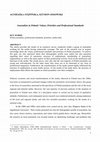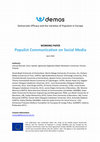Papers by Agnieszka Stepinska
Przegląd Politologiczny, Dec 30, 2023
Central European journal of communication, Feb 24, 2023
Journalism & Mass Communication Quarterly
Studies suggest that, at the routine level, news beats function as unique “micro-cultures.” Explo... more Studies suggest that, at the routine level, news beats function as unique “micro-cultures.” Exploring this “particularist” approach in news content, we compare how the interventionist, watchdog, loyal, service, infotainment, and civic roles materialize across 11 thematic news beats and analyze the moderating effect of platforms, ownership, and levels of political freedom on journalistic role performance in hard and soft news. Based on the second wave of the Journalistic Role Performance (JRP) project, this article reports the findings of a content analysis of 148,474 news items from 37 countries. Our results reveal the transversality of interventionism, the strong associations of some topics and roles, and the limited reach of news beat particularism in the face of moderating variables.

Zeszyty Prasoznawcze, 2021
The aim of this paper is to recognize the factors limiting journalists’ sense of autonomy and aff... more The aim of this paper is to recognize the factors limiting journalists’ sense of autonomy and affecting the level of their self-censorship during the last three decades of the post-transformation period. The issue will be addressed two-fold. First, we will analyze changes in the journalists’ perception on their professional autonomy. Second, we will examine trends in relations between the political system and media system in Poland since the 1990s. The findings show that in the 1990s journalists were still much more concerned about the political factors which could affect their work than about the economic ones. A decade later they had become much more aware of the economic pressures on their profession, such as owners’ expectations and market-driven journalism. In the last few years, however, the constant pressure of ongoing government reforms aimed at bringing the press under tighter political control, as well as the emphasis on ‘national’ content, has already led to some degree o...

How is political news shared online? This fundamental question for political communication resear... more How is political news shared online? This fundamental question for political communication research in today's news ecology is still poorly understood. In particular, very little is known how explaining news sharing differs from explaining news viewing. Based on a unique dataset of approximately 870,000$ URLs shared approximately 100 million times on Facebook, grouped by countries, age brackets, and months, we study the predictors of viewing versus sharing of political versus non-political news.We first identify websites that at least occasionally contain news items, and then analyze metrics of the news items published on these websites. We enrich the dataset with natural language processing and supervised machine learning. We find that political news items are viewed less than non-political news items, but are shared more than one would expect based on their views. Furthermore, the source of a news item and textual features often studied in clickbait research and in commercial ...

Public diplomacy is one of the soft power tools, implemented by superpowers, midsize and small co... more Public diplomacy is one of the soft power tools, implemented by superpowers, midsize and small countries globally. It became an element of foreign policy strategy of democratic and authoritarian regimes. Its new form – new public diplomacy – has been developed since about 15 years. The growing role of non state actors of international relations and external political communication and new technologies and tools of communication contributed a lot to the change in public diplomacy conduct. Networking, dialogue and intermestic context define the model of the new public diplomacy within the frame of open political and media systems. The former closed and latent diplomacy turned to open and public form, with much potential of benefits for all its stakeholders. The author analyses public diplomacy in the strategic communication context. She suggests an “oxymoron test” to evaluate the openness, networking character and symmetry of public diplomacy in the given case. K E Y WO R D S : P U B ...
Central European journal of communication, 2021

The article provides the results of an extensive survey conducted within a group of journalists w... more The article provides the results of an extensive survey conducted within a group of journalists working for the media having nationwide coverage. The aim of the research was to acquire knowledge about the values, professional standards and priorities of Polish journalists. To achieve this goal, not only questions about their demographic profile were asked, but also questions regarding their sense of autonomy, structure of employment, membership of journalistic organisations as well as the main aspects of their professional activity, level of job satisfaction and functions of the media. The results prove, inter alia, that the vast majority of Polish journalists are young and well-educated. On the other hand, they seem not to be interested in any form of professional integration. Furthermore, the transformation of the media system highly influenced the structure of employment in some media sectors. As the results of the study show, the structure of employment often affects the manner ...

This working paper presents the findings of quantitave and qualititave research into populist com... more This working paper presents the findings of quantitave and qualititave research into populist communication on Facebook. Specifically, we look at how populist politicians from all across Europe used Facebook in their campaigns for the European Parliamentary elections in May 2019 and compared this with a posts from July 2019. We start the paper with sections on research design and then outline the importance of social media for populist political communication. From here, we present the findings of our comparative research. We found that the use of Facebook varied widely around the bloc. Some countries – Spain, Italy, the UK, France, and Poland – display a more widespread use of social media and with more complex usage, whilst others, such as Lithuania, have a low usage level. As a result, we maintain that there is no, one online populist strategy currently in use. Instead, the frequency, tone and topic of social media usage by populist actors differs from country to country, actor t...

The aim of this paper is to present the conclusions drawn from a meta-analysis of the findings co... more The aim of this paper is to present the conclusions drawn from a meta-analysis of the findings collected with surveys that have been conducted among Polish journalists since the 1970s. The paper focuses on the trends and shifts in the journalitists’ motivations and roles perception that have been occurring in the last four decades. The findings show that since the transformation period in the late 1989s and early 1990s, Polish journalists seem to be more individualistic and professional-oriented than social and altruist-oriented. The contemporary model of the Polish journalism built upon journalists’ declarations on the media roles is a combination of the news-provider and a forum of a broad spectrum of the political opinion presentation – oriented model, with a watchdog – style journalism. Traditional roles of the Polish journalists, such as education and motivation of the citizens, seem to be of the secondary importance for the media people today
Środkowoeuropejskie Studia Polityczne, 2013

The International Journal of Press/Politics, 2021
The transition from low- to high-choice media environments has had far-reaching implications for ... more The transition from low- to high-choice media environments has had far-reaching implications for citizens’ media use and its relationship with political knowledge. However, there is still a lack of comparative research on how citizens combine the usage of different media and how that is related to political knowledge. To fill this void, we use a unique cross-national survey about the online and offline media use habits of more than 28,000 individuals in 17 European countries. Our aim is to (i) profile different types of news consumers and (ii) understand how each user profile is linked to political knowledge acquisition. Our results show that five user profiles – news minimalists, social media news users, traditionalists, online news seekers, and hyper news consumers – can be identified, although the prevalence of these profiles varies across countries. Findings further show that both traditional and online-based news diets are correlated with higher political knowledge. However, on...
Środkowoeuropejskie Studia Polityczne, 2007
Media - Kultura - Społeczeństwo, Oct 10, 2015
Central European Journal of Communication, 2019











Uploads
Papers by Agnieszka Stepinska